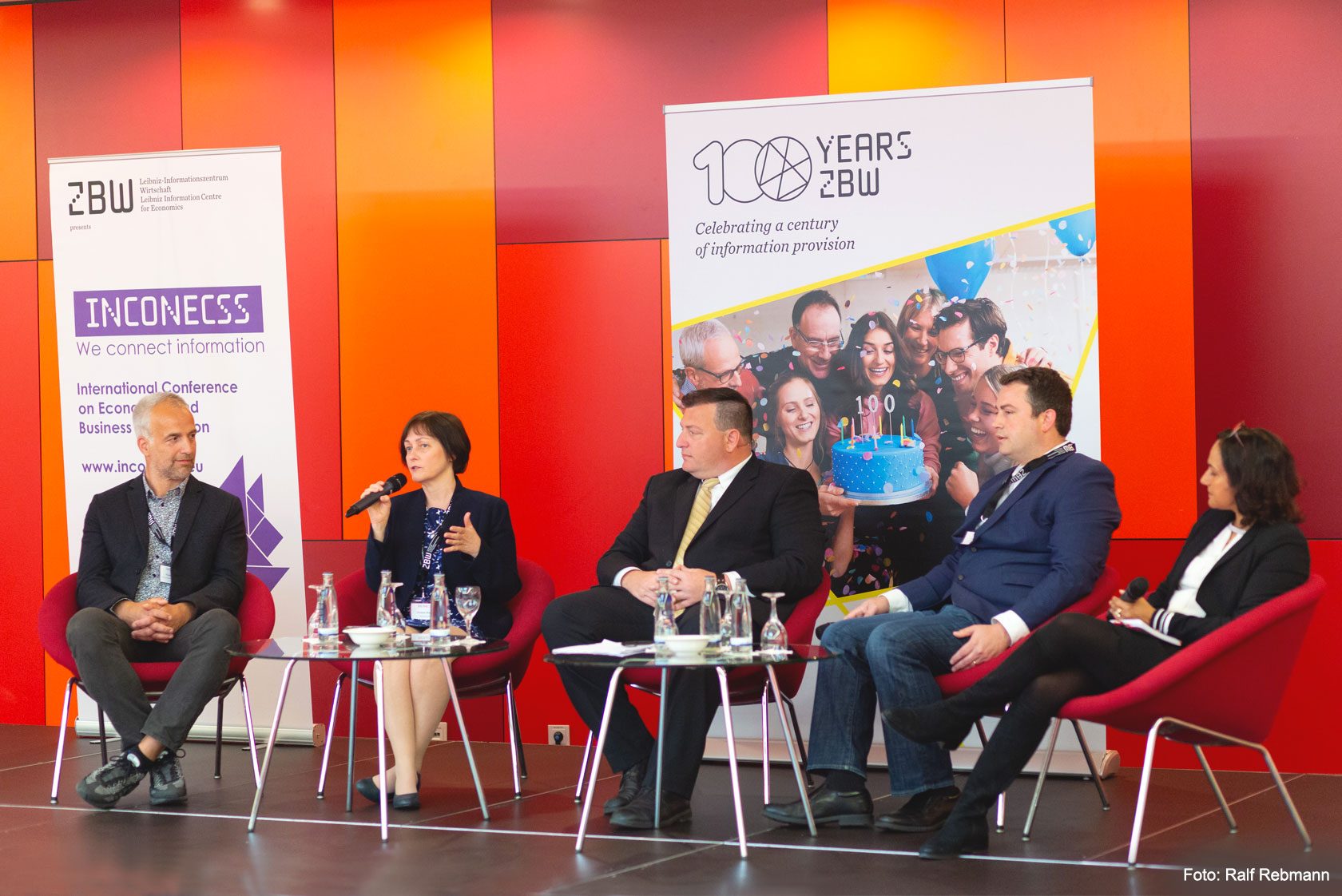
INCONECSS 2019: A Look Into the Future of Economics and Business Libraries
The rapid changes taking place owing to digital transformation present libraries with considerable challenges when it comes to providing information in economic sciences. The international INCONECSS symposium discussed strategies for dealing with these issues, such as developments in the area of open access, research data policies and predatory journals.
by Karin Wortmann und Ralf Toepfer
From 6 to 7 May 2019, academic librarians and information specialists in economics met in Berlin for the second international INCONECSS symposium (International Conference on Economics and Business Information).
Impressions from the #inconecss19 📸 https://t.co/O87wfAWQun pic.twitter.com/zvvJDc7X0v
— ZBW MediaTalk (@ZBW_MediaTalk) 6. Mai 2019
What makes this conference, organised by the ZBW, so special is its orientation towards an international audience of experts and its focus on economics and business. The participation of more than 100 delegates from 33 countries – mostly from Europe and North & South America, but also from Asia and Africa – shows that this combination generated a lot of interest. Under the motto “Digital Transformation: Scoping the evolving world of information challenges and business information”, the conference featured presentations on research-supporting services, research data management and open access, strategies, structures and qualifications for the digital transformation.
Libraries should support the entire research process
Mikael Laakso from the Hanken School of Economics (Helsinki, Finland) opened the conference with a keynote speech on „Customer Voices“ (PDF).
What do researchers really need and what kind of support do they expect from libraries and the information sciences? His analysis, which was based on the Ithaka S+R US Faculty Survey 2018, presented academic libraries as stakeholders operating between the institutional and individual interests of researchers in a changing research landscape. Summarising, Laakso cited Wenzler’s “Dilemma of Collective Action”, which states the following:
“For academic libraries to continue to achieve their traditional role of storing, organizing, preserving, and providing access to the scholarly record, they increasingly will have to take responsibility for the entire cycle of scholarly communication from publishing and editing through preservation, but it is unlikely that they will succeed in doing so through the uncoordinated actions of individual institutions and will require new experiments in cooperation and coordination.“
— (Wenzler, 2017)
This fittingly outlined the framework of INCONECSS 2019. Libraries should support researchers throughout the research and publication process (discovery, analysis, writing, publication, outreach, assessment), which can only be done in close cooperation with the stakeholders. INCONECSS 2019 accordingly presented and discussed a large number of new services, as well as the associated question of the new competencies libraries will require.
Digital badges can boost the visibility of libraries
The Baker Library of Harvard Business School, for example, presented a pilot project that responds to language-based requests for information. The participants of a “Management Workshops” were given the opportunity to ask Amazon’s virtual assistant Alexa general questions about the weather and the surrounding area or about topics relating to the workshop in order to explore the practical use of modern technologies in the everyday routine of libraries. The experience with “Digitale Badging” (PDF) as a form of e-learning at the University of New Hampshire also met with considerable interest.
A digital badge is a verified record of defined services or capabilities that can be integrated into various digital environments. It supports the modularisation of digital learning content. This helps libraries save resources for information skills training and better integrate them into the curricula of the departments. The benefits and innovative power of libraries become more visible in this way, while sharing and commenting on badge information in social networks enables wide coverage to be attained.
How does the digital transformation affect the concept of libraries?
Timothy Tully reported on a project to measure library services for Campus Incubators (PDF) at San Diego State University.
Bernard Bizimana then discussed the “development of a new business model” (PDF) at the HEC Montreal Library that meets the requirements of digital transformation.
It started with the question of whether libraries are still needed and if so, how they have to be set up. Research data and knowledge management services, data science, programming, data mining as well as data visualization and presentation are new fields of competence that libraries must develop for their new business model. It is crucial to develop projects together with the respective department to ensure user-orientation and acceptance.
A poster session gave participants the opportunity to present digital transformation projects in their institutions. Topics ranged from digital staff training, interactive OER tutorials and the use of robots as well as gamification. Lively discussion groups in front of the posters showed that this format for practical discussions was very well received.
Predatory journals and the role of the library as a gatekeeper
Since new services develop in the context of academic research and the publication process rather than in a vacuum, one session dealt with the negative spin-offs of the publication process: “Predatory / Fake Journals and Fake Science”. Two presentations examined the role of the library as gatekeeper and information literacy specialist, and how it should deal with these negative aspects. In his presentation “What is to be done about predatory journals?”, John Willinsky, Stanford Graduate School of Education, emphasized that predatory publishers rely on the publication fee-based business model, which is also used by many open access journals. Quality-assured open access journals, however, levy this fee only after making the decision to accept a publication on the basis of the results of the peer review procedure and this therefore actually constitutes an attempt to combat predatory journals. Karin Lackner and Clara Ginther subsequently presented the activities and experiences (PDF) of the Graz University Library.
The University of Graz was the first institution to offer information, advice and workshops on predatory publishing from 2017 onwards, culminating in an awareness-raising campaign in 2018. While Willinsky presented predatory publishing essentially as a kind of “Eyeball Business”, Lackner and Ginther emphasized the increasing professionalisation of predatory journals. The presentation concluded with a reflection on the challenges predatory journals pose to universities and libraries, especially in view of the current societal danger of academic research results being degraded to one opinion among many.
Close examination of open access landscape required
The “Open Access Landscape and Access to FED Services” session made it clear that open access cannot be equated with poor quality. Referring to Laakso’s keynote speech, according to which only about 5.5% of “Business, Management & Accounting” journals and only 8.2% of “Economics, Econometrics and Finance” journals are open access, Christian Zimmermann of the Federal Reserve Bank of St. Louis argued that this could also be due to the pronounced pre-print culture in economics. He added that this would lead to many research results being made accessible as working papers in open access before being “formally” published in journals. Research Paper in Economics (RePEc), which was presented by Zimmermann and others, has established itself as the central platform for the exchange of working papers.
Anna Mette Morthorst from the Royal Danish Library in Denmark reported on the results of the Danish national DEFF project Open Access Monitor – DK (OAM), which has improved the data available to open access, thereby supporting strategic decisions and price negotiations with publishers.
Although Denmark has committed itself to a national open access strategy that focuses on the green path of open access, the monitor data showed that the golden path also plays a major role in Denmark with about 25% of the total implemented open access.
What do the research data policies of journals look like?
The „Journal Data Policies“ und „Research Data Mining and Visualization“ session made it clear that new library services are increasingly being developed on the basis of proprietary research. The presentations of Melody Chin and Danping Dong “The Quest for Replicability: A review of research data policies in economics journals” (PDF), Singapore Management University, as well as “Data Policies of Economics Journals – Shifting Boundaries?” (PDF) by Sven Vlaeminck and Olaf Siegert (both from ZBW) examined the number of economic journals with data availability regulations as well as the respective quality of said regulations.
Both studies came to the conclusion that about 70% of economics journals now have a data availability policy. These regulations nevertheless differ significantly in terms of level of obligation; they are mostly recommendations. In comparison to a study conducted in 2014, Vlaeminck and Siegert found that the proportion of journals with a data availability policy increased by 41.4% in 2018 and the proportion of journals with an author responsibility policy by 5.1%. The significant increase was mainly due to the introduction of model policies by the major publishing houses.
In addition to the positive aspect of the increase in data availability policies, this has apparently also resulted in the policies becoming more diverse.
The joy of cooperation and lifelong learning makes libraries digitally fit
A panel discussion on “Digital Transformation”, in which Chris Erdmann (Library Carpentry), Ragna Seidler-de Alwis (University of Applied Sciences, TH Cologne), Frank Seeliger (TU Wildau) and Suzanne Wones (Harvard University, USA) participated, took another look at the topic of competencies and personnel. All participants in the discussion agreed that digital transformation demands more new skills and qualifications from employees alongside the traditional ones, as well as a high degree of flexibility. Newly designed training courses take these requirements into account, while lifelong learning and on-the-job training are important. The question posed by moderator David Patrician at the end of the lively discussion as to what is most important for libraries in preparing for digitisation was answered in different ways: on the one hand, the library should communicate and cooperate even more with the researchers in order to understand their needs and requirements, while on the other hand, an interdisciplinary library team should stimulate enjoyment of the innovative and varied work. Together with the possibility of implementing the younger generation’s ideas about flexible working time models, this could help recruit suitably qualified employees on the labour market.
Impressions from day two #inconecss19 📸 https://t.co/O87wfAWQun pic.twitter.com/GPvbQBByER
— ZBW MediaTalk (@ZBW_MediaTalk) 7. Mai 2019
The conference closed on a note that once again emphasized how important it is for employees to be highly motivated and qualified in order to successfully transform a library’s services. Given these ingredients, libraries will continue to ensure the high quality of the data and services they offer.
Further Information:
- Download the abstracts as well as the slides used in the presentations.
- Inconecss 2019 – a Summary
Featured Image: Ralf Rebmann©
View Comments

Guidelines: How to Implement Open Peer Review and Foster its Adoption
How can open peer review be implemented? Where else could open peer review be applied...



